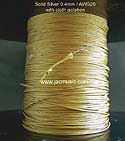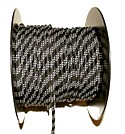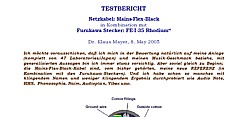Special high Quality wires for AUDIO

Introduction
Silver is one of the lowest resistance conductors, with ideal contact properties. Used in transformers and cables for the superior sound. Interesting, when silver ages, the surface gets darker, even close to black, which is mistakenly called silver oxide. This layer is composed of several materials, including sulphur, which is in the air as sulphur oxide gas, in very low concentration. Yet over the years it can collect. This dark layer is conductive, it is why high quality contacts are made of silver.
Cotton Isolation
Just look into really old equipment, and you will l see all wires have aged a lot. Plastics become brittle, causing leakage or short circuit risk. Yet cotton does not have this problem. On the other hand, you can easily pick through a cotton isolation layer with a sharp object, so some care is needed. Today's DIY prefer cotton for the fine looks. We have it in several ancient colors. Like: dark green, dark blue, ivory white, navy blue. Etc. It looks just like vintage cable.
Solid silver, soft out glowed
The wire is specified as 3N7, which means the guaranteed minimum is 99,97% pure. (N is for the number of 9's). It can be used for wiring loudspeaker cabinets, or for free wiring in amplifiers. This wire is made on special requirement for us. It was made from a 3N7 silver cylinder to begin with. Wire pulling is done by simply pulling a wire through a hole which is smaller diameter as the wire itself. This a sapphire tool. It has to be done in many steps, beginning with the raw cylinder. Each time after pulling, the cylinder becomes smaller diameter and longer, and after a few rounds it becomes a wire. Yes would eventually makes the silver hard and stiff, so after each step it needs to be out glowed, to keep the softness. This out glowing is done under protective gas to prevent building of oxide. This becomes very time consuming when thinner wire is made. This is why thinner wire is more expensive per weight unit.
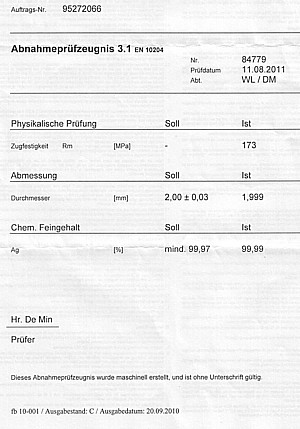 Certificate of quality
Certificate of quality
The wire is made in Germany. We had it tested by an external company, by industry standard EN10204. Here is a copy of such a certificate, for the 2mm wire. Even when in German, you can recognise the following:
Diameter:
"Should be " 2.00+/-0.03. Tested: 1.999.
Silver purity:
"Should be": Minimum 99.97%. Tested: 99.99%.
Strength:
By this test, a sample piece is stretched until in breaks, and the pulling force for this is documented.
Storage
Our electronic components are stored in a room with air drying equipment. This keeps all materials clean and oxide free. (Read more...)
Part1) Solid silver, soft out glowed
Part2) Cotton isolated silver wire
0.4mm / AWG 26. Solid Silver + Cotton cloth outside |
|
Solid silver wire with cotton Ordering code Black Ordering code Blue: Ordering code Yellow: |
Solid Silver Wire, with 1mm outside diameter, and inside is a solid 0,4mm /AWG26 silver wire. The cloth is cotton. All colors we use, are from the color chart, and are chosen like the colors you see in old radios. This thin and fine woven cloth will make the cable flex with a very good "feel", and it is ideal for making DIY phono cinch cables from it. Also very nice for complete wiring inside amplifiers. The cloth has no high voltage isolation properties. It can only be used for audio input signals.
The cotton is solder iron proof. Application: For making interlink small signal cables, and similar applications. Must be put inside a sleeve when you have high voltages around. Also nice for wiring of Moving coil transformers.
Colors are "antique" like found in old radios. We use "old gold" for YELLOW, "Brownish-Black" for BLACK, "Ivory" for WHITE, etc. |
0.8mm / AWG 20. Solid Silver + DOUBLE Cotton cloth outside |
|
Silver Core diameter: 0.8mm / AWG20 Ordering code White: Ordering code Black: Ordering code Red: Ordering code Blue: |
Make your own silver speaker cable with this!Solid Silver Wire, with a solid 0,8mm /AWG20 silver core, soft out glowed. This cable is double isolated, and the resulting cotton isolation is very strong, and will not damage when you walk over the cable. Inside is first only layer of white cotton, and over that is a second layer of cotton in color. Application:For speaker wires. You can use it single wired, or twist a double wire. When you twist it, order 5% more length because you loose this from twisting. How to twist? Here is how to make a cable from 2x red and 2x black. So 4 wires, going to one loudspeaker. For 2 speakers, and each is 2 meter away, it needs 4 meter cable in total. So 8 meter red wire, and 8 meter black wire. Take an electric drill, and put a screw hook in it. Fold the 8 meter piece in two, so you het 4 meters. Solder the open ends together provisionally. Tie this end to a table leg. The other end you pick up with the screw hook. Use the drill with small force, and stop when the gets suddenly much shorter. Let the length shorten some percent. You can't oversee this. Take the hook out, and repeat with the other color. After this, you have two twisted cables of 4 meter in front of you. Now put the hook in both cables together, and rotate the drill in the REVERSE direction. The cable will become a little longer again from this, and just drill it mildly, until you see the cable is tension free. It will have a very professional "feel" and is as nice as any ready bought silver cable! If you have no drill, you can also use just a small stick, and rotate the cable with that by hand. Just takes you longer. This will now end with 4 meters of 4-wire cable. Cut this piece in two, and you are done. For a vintage look, finish the wire ends like this, using white wood glue to attach the wire, or just attach shrink sleeve at the ends.
For speakers you can also use a single 0.8mm silver wire. So drill only one black and one red wire together. Up to 2 meters that is fine also. For more length, it needs 4 strands. Please note, the black cable is "antique" color, it is a brownish-black. With the 0.4mm cable you can also make nice speaker cables, but you need more wires then. For this, drill groups of 3...5 wires together, and then drill those groups these together in the opposite direction. That gives a nice, tension free, flexible cable. Good luck with it! |
Part3) Mains cable
|
|||||
Ordering code: |
3x 2.5mm This cable can be used to make very high quality mains cables yourself. This cable is designed to have high flexibility, and yet very resistant against stepping on it or other accidental abuse. The PVC shield is very strong, and flexible still. So any wear out at the position where is is mounted into the mains connector, sure is not happening. The inside the cable is with many soft cotton fillings. You will be surprised about how pleasant this cable is to work with! Maximum voltage 230V AC. The three internal mains wires have an isolation of high temperature rubber. (So not PVC isolation)
|
||||
Conversion AWG to Metric system. |
|||
| AWG Number | Ø [Inch] | Ø [mm] | Ø [mm²] |
| 4/0 = 0000 | 0.460 | 11.7 | 107 |
| 3/0 = 000 | 0.410 | 10.4 | 85.0 |
| 2/0 = 00 | 0.365 | 9.26 | 67.4 |
| 1/0 = 0 | 0.325 | 8.25 | 53.5 |
| 1 | 0.289 | 7.35 | 42.4 |
| 2 | 0.258 | 6.54 | 33.6 |
| 3 | 0.229 | 5.83 | 26.7 |
| 4 | 0.204 | 5.19 | 21.1 |
| 5 | 0.182 | 4.62 | 16.8 |
| 6 | 0.162 | 4.11 | 13.3 |
| 7 | 0.144 | 3.66 | 10.5 |
| 8 | 0.128 | 3.26 | 8.36 |
| 9 | 0.114 | 2.91 | 6.63 |
| AWG Number | Ø [Inch] | Ø [mm] | Ø [mm²] |
| 10 | 0.102 | 2.59 | 5.26 |
| 11 | 0.0907 | 2.30 | 4.17 |
| 12 | 0.0808 | 2.05 | 3.31 |
| 13 | 0.0720 | 1.83 | 2.62 |
| 14 | 0.0641 | 1.63 | 2.08 |
| 15 | 0.0571 | 1.45 | 1.65 |
| 16 | 0.0508 | 1.29 | 1.31 |
| 17 | 0.0453 | 1.15 | 1.04 |
| 18 | 0.0403 | 1.02 | 0.823 |
| 19 | 0.0359 | 0.912 | 0.653 |
| AWG Number | Ø [Inch] | Ø [mm] | Ø [mm²] |
| 20 | 0.0320 | 0.812 | 0.518 |
| 21 | 0.0285 | 0.723 | 0.410 |
| 22 | 0.0253 | 0.644 | 0.326 |
| 23 | 0.0226 | 0.573 | 0.258 |
| 24 | 0.0201 | 0.511 | 0.205 |
| 25 | 0.0179 | 0.455 | 0.162 |
| 26 | 0.0159 | 0.405 | 0.129 |
| 27 | 0.0142 | 0.361 | 0.102 |
| 28 | 0.0126 | 0.321 | 0.0810 |
| 29 | 0.0113 | 0.286 | 0.0642 |
| AWG Number | Ø [Inch] | Ø [mm] | Ø [mm²] |
| 30 | 0.0100 | 0.255 | 0.0509 |
| 31 | 0.00893 | 0.227 | 0.0404 |
| 32 | 0.00795 | 0.202 | 0.0320 |
| 33 | 0.00708 | 0.180 | 0.0254 |
| 34 | 0.00631 | 0.160 | 0.0201 |
| 35 | 0.00562 | 0.143 | 0.0160 |
| 36 | 0.00500 | 0.127 | 0.0127 |
| 37 | 0.00445 | 0.113 | 0.0100 |
| 38 | 0.00397 | 0.101 | 0.00797 |
| 39 | 0.00353 | 0.0897 | 0.00632 |
| 40 | 0.00314 | 0.0799 | 0.00501 |
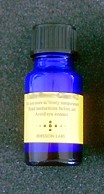
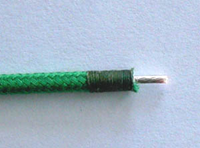
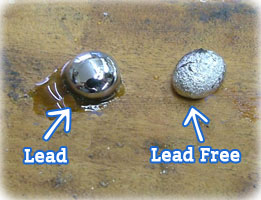 Not so with lead-free solder. It is only this shirt moment ( where the flux burns away) the solder flows nice, and after that is stops doing so. This combines actually well with the higher melting pint of silver solder. It is just, the moment of good soldering shorter. So you just need a lot more flux, and this much may not be present in that the standard solder core . If you need to solder a larger item, like solder lugs, or thicker wires, you simply need to apply extra flux, and heat up the solder joint a lot more, as you were used with lead solder. For best optical results, you can remove the flux residue later with alcohol, and it will look nice and clean afterwards.
Not so with lead-free solder. It is only this shirt moment ( where the flux burns away) the solder flows nice, and after that is stops doing so. This combines actually well with the higher melting pint of silver solder. It is just, the moment of good soldering shorter. So you just need a lot more flux, and this much may not be present in that the standard solder core . If you need to solder a larger item, like solder lugs, or thicker wires, you simply need to apply extra flux, and heat up the solder joint a lot more, as you were used with lead solder. For best optical results, you can remove the flux residue later with alcohol, and it will look nice and clean afterwards. 